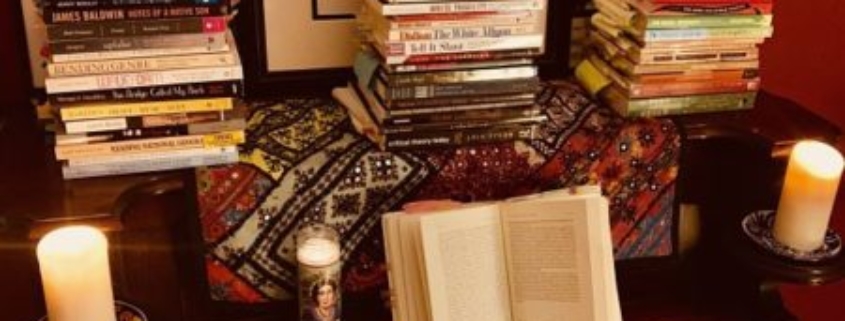Mad Scientist
Books rest on shelves, floors, tables, and chairs in my home. Film posters, book covers, maps, and even postcards hang on my walls. Plants crawl down the mantle, down from the ceiling, and sit in corners, window sills, shelves, and on tables.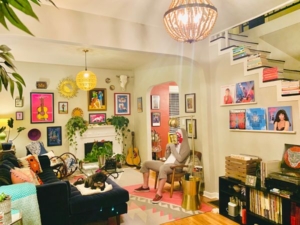
A globe, a mason jar of number two pencils, a coat rack made from old skis, coasters from The Globe my cousin gave me, a poster from the Arcade Fire concert I attended, Virginia Woolf and Frida Kahlo saint-like candles from Strand Bookstore, the abstract painting made by my friend, paintings by my partner’s mother, sister, and uncle. My great-cousin’s shillelagh from Ireland given to me by my parents, my granddad’s WWII diaries willed to me with the hope I’d write his story, my childhood blanket made by a close family friend, my great-grandmother’s Cuban coin ring smuggled into the country during the revolution. Photographs close-pinned above our bed. Collected piece by piece over time.
Some given to me, some bought on my own. Some given to my partner, some bought on his own. Rich colors carried from place to place make white walls home.
The things we hang and rest on shelves speak. These walls and shelves hold silhouettes of people that lived here before, from the time the house was built in 1900 to the present. These objects, these things live in the words of those who lived here before us. Their words stick to plaster and coats of paint. Words and walls and shelves hold history—mine, and yours, and everyone’s—to tell it all takes time, takes practice, takes play.
We’re not supposed to care about things. And words are just things. Things written, sung, preached, shouted, and shared. Yet, I pledge my allegiance to them. I firmly support their power. Then, I pick them up for safekeeping, adding them to my collection. Hints of them sneak into my writing like boys at girls’ slumber parties.
My influences are like my Craigslist bike—the yellow Bianchi frame is still the same, but I changed the pedals to purple, switched the tires to blue, and made the handlebars green. Their words provide the framework, but I steer mine to their destination.
Even this metaphor is like the things Tim O’Brien carried or Zora Neale Hurston’s bag, but I’m making it my own.
We writers are hoarders of syntax and polygamists of diction. The compound, complex, and simple burst out of closets and climb to the ceiling. I welcome more words to my colony. Then, I lay them all out in front of me to play like a child emptying her toy box. No one told me I couldn’t put my He-Man figurine in Barbie’s Dream House. No one should tell me that I can’t use Leonard Pitts in my poetry or Louise Erdrich in my essays.
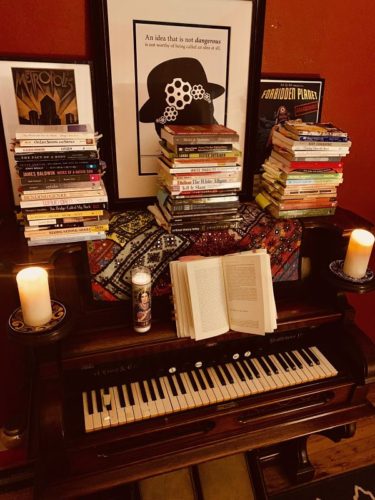 I am the mad scientist—stirring a vat of Virginia Woolf’s stream of consciousness, Sherwood Anderson’s grotesque, Langston Hughes’s resistance, Octavia Butler’s vision, Sandra Cisneros’s fragments, Elie Wiesel’s memory, Richard Wright’s poetic honesty, Maggie Nelson’s transitioning textual body, Kazim Ali’s text queering, Julie Otsuka’s point of view, Eula Biss’s braiding, Rebecca Solnit’s fire, Claudia Rankine’s exposure of imagination, Roxane Gay’s direct reflection of today. Each word still wiggling as I throw it in.
I am the mad scientist—stirring a vat of Virginia Woolf’s stream of consciousness, Sherwood Anderson’s grotesque, Langston Hughes’s resistance, Octavia Butler’s vision, Sandra Cisneros’s fragments, Elie Wiesel’s memory, Richard Wright’s poetic honesty, Maggie Nelson’s transitioning textual body, Kazim Ali’s text queering, Julie Otsuka’s point of view, Eula Biss’s braiding, Rebecca Solnit’s fire, Claudia Rankine’s exposure of imagination, Roxane Gay’s direct reflection of today. Each word still wiggling as I throw it in.
But this is nothing sinister. I do not torture words; I let them bloom.
Still, I realize what may come to mind when thinking about the mad scientist caricature in film and literature. A white man driven insane by his work. Dr. Jekyll becomes Mr. Hyde or the scientist in the film The Fly turns himself into the insect. Their humanity transformed into monstrosity. Good turned to evil. Or the already evil, downright diabolical, mad scientist with crazy white hair, a white coat, and bulging eyes, paces in his laboratory plotting ways to destroy the perfect society. What’s worse: writing a trope or being one? Carmen Maria Machado’s writer narrator asks in “The Resident.”
I am the mad scientist—but not him. (I may be paranoid but not an android.)
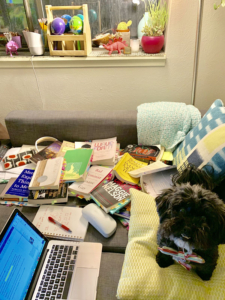
Re-vision
I’ve got white skin and crazy hair with white strands here and there. I’ve got doctors’ papers diagnosing my disorder. But what makes me mad is not my concoction but the world we live in. I am a woman. I embrace defiance, disorder, disillusionment, deconstruction. When given a command, I am absentmindedly wandering in a world that doesn’t yet exist—I hear Vincent Harding say, I am a citizen in a land that does not yet exist—a world where there isn’t an Other, only One—a You, an I, and a We—not an Us versus Them. I am absentmindedly, not aimlessly, sifting through my collection of constructed words that break, that bury the laws, the order deemed natural and normal that oppresses most of us—working to distance my mind from the carefully curated lies of the monstrous bodies who established these paradigms. (You don’t own me.)
Many writers say they are storytellers and that’s okay. I’m not focused on narrative arc, but what’s organic. I’m the mad scientist here to give words the space to do what they do—to move, to meander, to travel until they reach your door, soliciting next steps. (This must be the place.)
Words are living, we are living, ravenously. And we can’t survive on the diet we’re fed. We hunger for something more satisfying. Mere air, these words, but delicious to hear, Sappho says.
Unsatisfied by what is, I nourish what’s becoming.
In my vat, my words and influences clink glasses and dance to Lizzo’s “Juice” and Kool & the Gang’s “Celebration.” Sometimes they get too rowdy, but sometimes they don’t get along. Intertextuality isn’t ever cut-and-dry. Sometimes Solnit confronts Anderson for his portrayal of fragile women. Sometimes Gay calls out Woolf for limiting intellectual worthiness to white, privileged women. I have to sit with the things conflicting. I have to confront them honestly. Listening to them helps me think about the past, the present, and my life within.
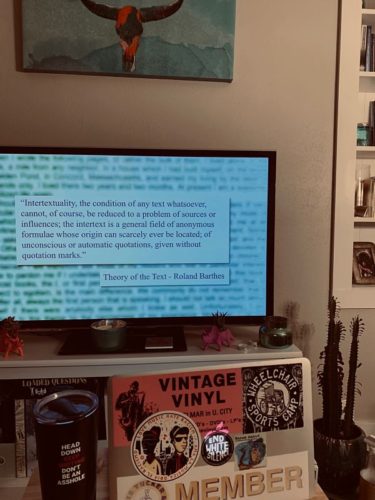
On TV: Uplife Studio’s What is Intertextuality? Literary Theory Course
But sometimes I’m overwhelmed by their wisdom and doubt my ability to continue. I hear that loud, sharp, high-pitched ringing in my ears. And sitting becomes stuck.
When my words aren’t moving, I have to move. (Twist your head around.) I pace from room to room and, if need be, around the neighborhood. I bring my dog with me. Together we’re two animals sniffing for a place to leave our mark. A wall of sweet perfume hits me as I pass the blooming lilac bushes. I think of my mother spraying perfume on her wrists, dabbing her wrists to her neck, then spraying again into the air and walking into the scent, letting it fall onto her clothes and skin. Lawnmower blades slice through blades of grass, flowers pop pink, orange, yellow, red, and purple at the first sight of spring, sawdust scatters in the light by the construction site. I’m reminded of Ana Maria Spagna’s Uplake and all the things she taught me. Twirling my hair, I wind thoughts down streets and, eventually, to white space. The music begins again. They fill the place. They feel the tempo of Giorgio Moroder’s arpeggiator as everybody sings to Donna Summer’s “I Feel Love.”
I proceed with glee but caution. And only disturb the neighbors enough to wake them. And I hope other experimenters continue to offer me the same courtesy.
The record switches to Ween’s “Your Party.” We had a nice time at your party. I learn to contort my words, not my body, and how the right combination of them can stretch.
Listen to Kate Carmody’s Mad Scientist’s Mix Playlist.
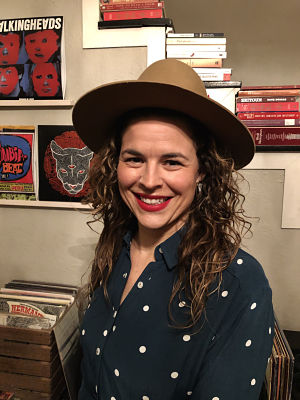 Kate Carmody is a writer, teacher, and activist. While pursuing her MFA in creative nonfiction at Antioch University in Los Angeles, she works as a blogger, assistant blog editor, and a member of the community outreach team at Lunch Ticket. Her writing recently appeared in Stain’d Arts. She was born in St. Louis and lives in Denver, Colorado with her fiancé and dog, Corky St. Clair. The three of them are also in a band called Datafacer, named after her niece’s childhood doll. Twitter: @KateCarmody8 Instagram: carmo8
Kate Carmody is a writer, teacher, and activist. While pursuing her MFA in creative nonfiction at Antioch University in Los Angeles, she works as a blogger, assistant blog editor, and a member of the community outreach team at Lunch Ticket. Her writing recently appeared in Stain’d Arts. She was born in St. Louis and lives in Denver, Colorado with her fiancé and dog, Corky St. Clair. The three of them are also in a band called Datafacer, named after her niece’s childhood doll. Twitter: @KateCarmody8 Instagram: carmo8

